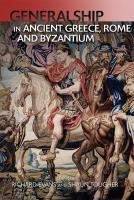
Edinburgh (2022) h/b 375pp £90 (ISBN 9781474459945)
This carefully edited and proof-read book consists of 16 chapters, by a blend of established and early-career scholars. It is based on a panel on ‘The Art of Generalship: Late Antique, Byzantine, and Chinese Ideal’ at the Leeds ‘International Medieval Congress’. The ‘original’ eight papers are obviously aimed at Byzantine specialists: of these, I would pick out, as of potential wider interest to teachers, chapters by Shaun Tougher on the possibility of eunuch generals; and by David Graff, citing speeches reported from late Tang-dynasty China which show a fascinating contrast with those in the classical tradition.
The ‘additional’ eight articles cover Greece and Rome. Even these are not primarily aimed at school Classics departments, not least as the volume is currently hardback only. If it does emerge in paperback, there is material that I think teachers could use at A-level. For example, Richard Evans’ ‘Commemorating Thermopylae’, regards Leonidas as a disastrous general, and Thermopylae therefore a triumph of commemorative poetry rather than the Spartan military. Michael Taylor, ‘Generalship and Knowledge in the Middle Roman Republic’ suggests that there were advantages as well as disadvantages to the amateurish system of one-year consuls/generals; his explanation of the system of magistracies would be an excellent introduction for sixth-formers starting AH/CC topics on the later republic. Finally, to illustrate how dynamic a subject Ancient History is, one could do no better than recommend David Potter’s chapter on Decius and the Battle near Abritus. He shows how twenty-first-century discoveries of literature (Dexippus, Scythica) and archaeology combine to provide an account of the emperor’s last campaign that is substantially different from that of sources previously available.
Melvin Cooley
